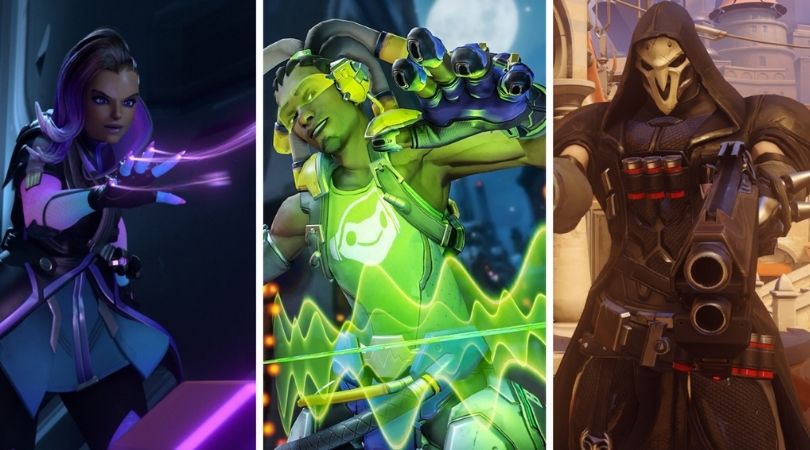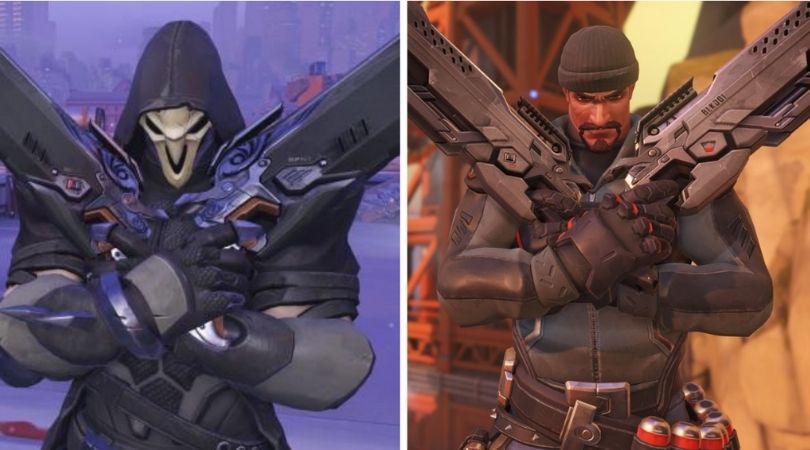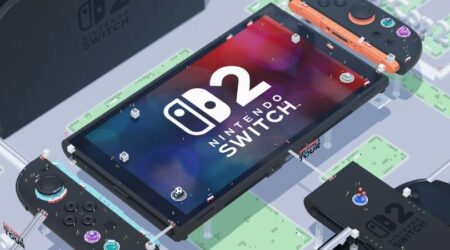
Latinidad essentially means a Latin experience, in usage. Within our communities, it refers to the ways that we are Latin. In media, as with most groups, the latinidad of characters are often restricted to stereotypes or only representative of one group. In a medium like a multiplayer first-person shooter (FPS) games are able to showcase a variety of characters, and when done right, can exemplify a multitude of experiences. Overwatch is solidly the latter. In an earlier piece about the women of Blizzard’s shooter, I outlined how the stories associated with these characters have showcased women whose experiences are not defined by one example of feminity but instead represent many.
To celebrate Hispanic Heritage Month, which I personally prefer to call Latinx Heritage month, I wanted to take a moment to explain how Overwatch showcases three unique identities and experiences within the Latin community. Helping showcase the differences, nuances, and cultures, that all go into an individual latinidad. Like any other person, our identities as Latinx are influenced by the worlds were born into, the areas we live, the languages we speak, and the culture around us. The writers behind Overwatch have taken this into consideration.
When you search for Latinx characters in video games, you can list them all on one page. The majority of them are non-playable characters or have backgrounds grounded in extremely reductionary storytelling. More often or not this only leaves villains, drug dealers, or just a playable character in a fighter. Frequently, in cases where we are the main characters, those protagonists are voiced by white actors, like Rico Rodriguez in the Just Cause franchise. The only notable playable Latinx character with a story is Dom, Dominic Santiago, from the Gears of War franchise. Playable through co-op play, he really shines in Gears of War 2. A character in all three base games, he is a character that has a story, a family, a life, a purpose.
The only major area where Latinx are visible as playable characters have been in fighting games — I mean, Tekken anyone — however, they are often stereotyped as the capoeira master or luchador, which for the medium I understand. That being said, a lot can be done with a character’s voicelines and skins that show cultural relevance and not cultural charatictures. However, charatictures are par for the course in that genre across the board.
In Overwatch, we get to play as three unique Latinx characters. All of which exemplify different identities and experiences of being Latinx. Although the FPS rarely has a story within the game itself, Blizzard has worked at creating a history and lore for almost all of the characters involved in its world through animated shorts, comic books, dialogue between characters while waiting for a match to start or playable story missions. In addition to the lore, when we choose to play these characters we hear them speaking and get at least a small glimpse into their personality, my favorite of which is Sombra taunting a kill with “aw pobresita,” there is a kind of patronizing tone that you only know if your grandma told you it when you were complaining for no reason.
Sombra

From an orphaned girl that had the world stacked against her, to one of the greatest minds in the Overwatch roster, Sombra breaks almost every Latina stereotype. Voiced by Carolina Ravassa, Sombra is a hacker extraordinaire who began hacking to survive in a city in Mexico which has been ravaged by the Omnic crisis.
With most of Mexico destroyed she utilized her hacking skills to survive, eventually helping the Los Muertos gang lead a revolution against a corrupt government. She and Los Muertos began the revolution to support those in most need of assistance while the government only worked to rebuild for the rich. Eventually, her advances in hacking technology outpace technology itself to the point where she chose to become the technology.
Now, after being forced to erase all traces of her identity when she stumbled upon a global conspiracy, she is now on the quest to find them. After she aligned with Talon, an organization that seeks to sow turmoil across the globe to strengthen the human race, she has remained her own woman. Like many of Talon, she uses their power and resources to achieve her own goal: taking down the people who compromised her identity.
[NEW HERO – NOW PLAYABLE] Sombra Origin Story | Overwatch
Decrypt the mysterious past of Overwatch’s newest hero: Sombra. Learn more about Sombra : http://blizz.ly/Sombra Start Your Watch today: http://blizz.ly/BuyOverwatch Like Us on Facebook: http://www.facebook.com/playoverwatch Follow Us on Twitter: http://www.twitter.com/playoverwatch
The importance of a Latina who is not only interested in computers but has outpaced technology to the point of integrating it into her body stands as a powerful example for Latinx kids who may pick up the game and play. Latinxs currently make up only 6.8% of STEM and continually one of the most underrepresented demographics in top tech companies. Beyond the realities of representation in science, there are two stereotypes in particular that Sombra breaks.
Latinas are often seen as temperamental and hypersexualized. Sombra’s character model isn’t there for the male gaze, in fact, in her default skin, she is completely covered and dressed for tech. In all situations they have shown her, she is one of the calmest heroes, working silently in the shadows and for herself over everyone else, even over her team at Talon. Always competent, always adapting, and always hacking.
Lúcio

Afro-Latinxs are Latinxs. It may seem like a simple sentence, but in the Latin community colorism and racism is a real issue that many Latinx face daily, especially for those who live in Latin America. In fact, blackface is still a “tradition” that continues to happen throughout Latin America. At Carnival, on variety shows, Latin America’s racism is front and center. This is the ugly reality that Latin communities rarely acknowledge.
By including Lúcio, who is an Afro-Brazilian, Blizzard showcased an important identity which is often looked over in media. Notable Afro-Latinas like Tessa Thompson, Lupita Nyongo, and Miguel often have their Latin identities ignored or erased by both Latinx and Non-Latinx alike. This is a chronic issue that continues to happen with fictional Afro-Latinxs as well, most noticeably with Miles Morales and most recently with the Charmed reboot.
Voiced by Jonny Cruz, his full name is Lúcio Correia dos Santos and he aims to use his international stardom to impact social change. After growing up poor in Rio de Janeiro’s favelas, he felt the need to help those around him as the city recovered from the Omnic Crisis. His answer was music. When India’s Vishkar corp came into the city to help rebuild, their promise of a better life was shown to be a lie. He then stole their sonic technology which had been used to oppress his community and converted it, leading a charge to thrown the company out of their city.
Unfortunately, Lúcio is one of the heroes who hasn’t received an animated short yet and his information is only made available for those who seek it out on the Overwatch website which house Hero stats and stories. Because of this he just seems like a DJ, which I think has fueled some of the valid criticism of the character. Some took issue with his alternate skins during last year’s anniversary event.
His skins are athletics or music-based especially in comparison to other character alternate skins. Those who take issue with his skins ground it in the problematic way that media portrays Black men as either athletes or entertainers. If you want to read more on this issue, you can check out this article. Although I don’t completely agree with this assessment given, I do believe the character deserves other skins exploring the large and vast Brazilian culture he is from.
All of this being said, skins are one thing and the story is another. I am hoping to see shorts that involve him and explore his rise to stardom and specifically how he enacted real and positive change in his community. This will do so much to change his persona from just a DJ to the Hero he is.
Reaper (Gabriel Reyes)

Gabriel Reyes, voiced by Keith Ferguson, is most well known as Reaper and he is one of the most popular characters in the game. Where the other characters I’ve talked about are from Latin America, Reyes is US-born. It may seem like a small thing, but when you look at US media, foreign-born Latinxs are the ones winning Oscars, being cast, and within our own community, US-born Latinxs are often seen as less than, like we are somehow not fit to call ourselves by our ethnicity because we weren’t born in the countries of our families. But when you look at Mexican-Americans, many of us come from families who have always been in the South West and California, native to the land and forgotten.
Beyond this, my personal connection and appreciation of this character’s inclusion, Reyes is a soldier. As of 2017, 40% of reported active military servicemembers were people of color, with Latinxs making up 12% of that population — excluding those who serve from Puerto Rico. Reyes’ identity as a soldier is integral to his story like it is for people in the real world.
Born in Los Angeles, we haven’t received his ethnicity beyond Latin but I would make a guess that Reyes is in fact Chicano, due in large part to his Mariachi skins that are some of my favorite in the game. As one of the original Heroes, he was shrouded in mystery. He doesn’t have much to his story in an official capacity like Sombra does with her own shorts, but he is in the background of many and was shown for the first time out of his Reaper persona in the Uprising campaign in-game event. He also appears in the web-comics and posts from the Atlas Network on Blizzard’s official website.
Prior to the Omnic crisis he was, Reyes enlisted in the military where he met Jack Morrison, also known as Soldier 76. He was the leader of the spec ops team Blackwatch where he apprehended fugitives like Jesse McCree and turned them into operatives. A fan of more aggressive tactics and it led it led to a big division between him and the ways that Overwatch functioned. Coupled with Morrison’s promotion to Overwatch Commander, their relationship became volatile.
When the Overwatch Swiss headquarters was bombed he was believed dead. But instead of death he was saved and he became the merciless mercenary Reaper and he set on his way to eliminating the remaining members of Overwatch. Now, Reaper works with Talon but for his own gains and those aren’t known. Even his association with Talon is as he needs.
There is more to his story as it now spans multiple comics, backgrounds in other stories, and a campaign. A little searching for Soldier 24, Gabriel Reyes, or Reaper will pull up even more lore.
When we look at the games three Latinx characters, Sombra, Lúcio, and Reaper (Reyes), you see distinct stories and ultimately different identities for Latinxs of different cultures to connect with. Contrary to the popular belief that Latin culture is one culture, it is actually a tapestry of cultures that have commonalities between them but have a difference that makes them uniquely themselves.
These characters are also all voiced by Latinx voice actors, due in large part for Blizzard’s focus on accurately representing their characters from research into their backgrounds and hiring voice actors that reflect the cultural backgrounds of their characters. However, Cruz does not speak Portuguese, the language spoken by his animated counter-part Lúcio as pointed out by Judy Jetset in the Latinx in Gaming roundtable episode of our podcast. It’s noticeable for Brazilian players.
All of this being said, these characters aren’t perfect but they are a large step in the right direction of representing the diversity within the Latinx experience, Latinidad. As you can tell by these brief descriptions of their stories, the identities of these Latinx characters are rich and are far beyond those who have featured in other games and are voiced by actors who represent the culture — with some exceptions like Dom in Gears of War. There is more to do with these characters, especially Lúcio, and more of their stories to be highlighted in future animations.
However, at the end of the day when I’m thinking of Latinx representation in games, I think of Overwatch.






